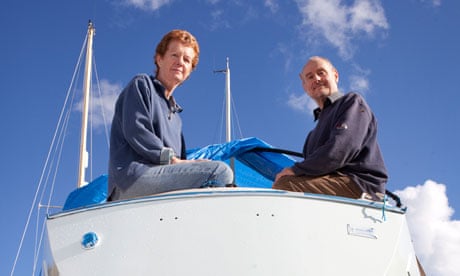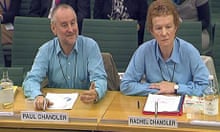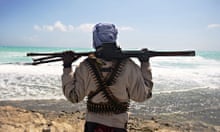Because crime is by its nature random, there can be no such thing as a typical victim – and yet we are all familiar with the modern media narrative that makes so many victims sound the same. It almost feels as if we could write the script of their experience ourselves, for rage and guilt, trauma and depression, and above all, wounded blame, are the emotional legacies we have come to expect. Yet nearly a year on from their ordeal, Paul and Rachel Chandler chart their own quiet course, declining tabloid cliches in favour of singularly thoughtful reflection.
In October 2009 the Chandlers set sail from the Seychelles for Tanzania. Ninety miles offshore, their small yacht was boarded by armed Somali pirates, who held them hostage on land for more than a year, demanding a ransom of many million dollars. The British government stood by its policy of refusing to pay, and there was some criticism of the couple after early media reports described their course as close to the notoriously dangerous Somali coast. In fact they were thousands of miles away, just off the Seychelles – but Somali pirates have increased their range by launching offshore attacks from other hijacked vessels, which they use as mother ships at sea, and this was how the Chandlers were seized. The kidnappers would release footage of their captives periodically, and as time went on it looked increasingly unlikely that they would survive. But after almost 13 months a private ransom was paid, chiefly by their extended family, and the Chandlers were freed.
So when the couple gave evidence to a parliamentary select committee last week on piracy, they knew what they were talking about. Another British tourist was kidnapped by what are thought to be Somalis only last month, lending a horrible urgency to their words. Throughout their captivity, the pair told the committee, the Foreign Office had failed to make any useful contribution, and had offered their family little more than "tea and sympathy". At home a few days later, in Dartmouth on the south coast of Devon, Paul, 61, makes the point to me more bluntly: "The family was pretty pissed off with what they got from the FCO."
The painfully gaunt faces we saw during their captivity have gone, and the couple look healthy and relaxed, bearing no visible trace of what they went through. Sipping tea and overlooking Dartmouth's bay, they look exactly like what they are – a retired engineer and economist, middle-class and middle-aged, who love Radio 4 and live for sailing – so much so, in fact, that it's quite hard to believe that this time last year they were being held at gunpoint in Somalia. Paul says he rarely even thinks about their time in captivity now, unless something such as a select committee invitation comes along – which they accepted because they felt they had something important to say.
"We have no problem with the government's policy not to negotiate with kidnappers. But it can say that – and then still do a lot more to help the families. It would have been so easy for the Foreign Office to say: 'We can do nothing,' but then refer the family to either the police or the commercial sector [private kidnap consultants]. But they like to propagate the myth that they're beavering away behind the scenes for every person in distress overseas. And they are not."
"What our family needed," Rachel, 57, explains, "was immediate crisis-management advice – they needed to be told how to form a crisis-management team, they needed background advice, and advice on what their options were, including negotiating a ransom. Also, our captors were very aware that media coverage would increase their chances of getting a lot of money for us – but the Foreign Office never advised a media blackout."
An FCO spokesman has said its team did "everything they could to secure the couple's safe release", but this raises only an ironic half-smile. "Within the scope of competence within the Foreign Office, it may well be true that they did everything they could," agrees Rachel. "But they didn't treat our family as the intelligent people that they are. If our family hadn't wanted to help, we'd still be there." Quietly, Paul adds: "And the Foreign Office would be happy."
Do they actually think the FCO would have been happy to see them die, to underline the message that Britain doesn't pay ransoms? "Absolutely," Paul agrees, then looks slightly worried. Before he can retract, Rachel interrupts: "The logical conclusion of that policy is that in a situation like ours, with no hope of a diplomatic or military rescue, people like us would be left for dead. It's a no-brainer. There's no other conclusion you can come to."
It was private consultants who helped the family negotiate with the kidnappers, whose initial demand for $7m (£4.3m) was painstakingly whittled down to $440,000. Relatives raised the money between them, and it was dropped in cash from an aeroplane last June. By then, however, the kidnappers had been encouraged to hold out for more by media speculation that other parties might also pay to set the Chandlers free. After almost five more months, their release was finally negotiated by a Somali taxi driver from east London, so ashamed by his countrymen's crime that he raised an unconfirmed $200,000 from the Somali diaspora in Britain, and personally delivered it to the kidnappers in exchange for the hostages.
The couple had spent 388 days in captivity, some in solitary confinement and most in makeshift desert camps, guarded by drug-addled, illiterate young men toting AK47s. Severely beaten at one point, and malnourished by a diet of goat's liver, rice and spaghetti, they endured mental and physical torment that would send a lot of people – and certainly me – quite mad. Their book about the experience, Hostage, is a gripping read, not least in its account of the different devices each deployed to keep a grip on sanity.
Rachel held on to her mind by sending it as far from Somalia as she could, revisiting childhood memories and daydreaming about cherished people and places, whereas Paul refused to let himself think about his old life. "I absorbed myself in the world of the gang and goings-on," trying to learn the language and make friends with his guards.
Since their release, they have read guidance notes on how to be a good hostage. "I think we would have got quite good marks," he grins. "But there were some things that Rachel couldn't implement, and one was to establish a rapport with your captors. There was the fact that she was a woman, so they wouldn't react to Rachel at all except as being a chattel." When the gang first separated the couple, he recalls, the Somali men were dumbfounded by Paul's acute distress. "From my limited understanding of them and their culture, if the situation had been reversed they wouldn't have given a damn."
Even if the pirates had been the friendliest men in the world, I suspect Rachel would still have blanked them. She was simply furious with them – so I wonder if she was also annoyed with Paul for trying to form relationships.
"I certainly found it hard to accept," she agrees, as Paul smiles. "And yes, yes I suppose – annoyance? Yeah. We did bicker occasionally about how to handle them, but we soon called a truce. Because life's too short – and our lives were particularly short at that time."
Yet for a long time Rachel maintained she would rather die than see their captors get any money. "I just very selfishly couldn't imagine the idea that our lives would just lose everything, and that we'd have to start from scratch. The idea that we'd be left with nothing and that our dream of sailing the world was just finished – at first I was grieving that. I didn't want to lose everything."
Surely she'd lose more by winding up dead? "Yes, but we weren't dead yet. The idea that the SAS were going to come in and beat the hell out of these guys and whisk us away was a wonderful way to keep spirits up, even though I knew in my heart that it wasn't really going to happen. And I also hoped that there was some humanity in these people. It took me a long time to accept that these people were so callous, so ruthless, and that they couldn't see that we were just an ordinary couple from Tunbridge Wells with little money, and they were taking our lives from us. So I think I held on desperately to the hope that if our family just said: 'No, we have no money,' they would accept it and eventually let us go."
Paul, meanwhile, was desperately trying to get his family to release the couple's life savings. "I never thought about the emotions. I don't do that with emotions. I just thought, let's get out of here. My view right throughout was I will do absolutely anything to get us out of here. And I would have done anything, I didn't worry about the future. If we'd had to sell everything and be left penniless, I thought, well I'll deal with that problem when it occurs."
But because the couple were deemed "under duress", British law prevented anyone from accessing their accounts. Even if they'd been able to, Rachel still didn't want to give the gang their money. "Not early on, no. No, it took me time to come round to it." She thinks for a second, and grins. "But if Paul had signed away his half I could hardly have refused to sign away mine." Her husband points out equably: "Well, you could have stayed there." Rachel laughs affectionately. "Yes, I suppose I could have."
I'm not sure I've ever met a more strikingly intimate couple than the Chandlers. Married for 31 years, with no children, they leave you with the sense that they have only ever needed each other, and differences of opinion are accommodated within an equanimity of intellectual respect. They get into quite a debate about the moral distinction between survival and greed when Paul says he always saw their kidnap as a "purely commercial transaction", no more deviant in the context of Somalia than a business deal would be in London. "But the reason why I took it personally," Rachel counters, "was this smug belief they had that they would make millions of dollars out of us. It did really irritate me, the fact that these young men had no idea – no idea – what they were doing to us."
"I think we would all go that way under the same circumstances," says Paul. "I think we're all driven by greed." Quietly but firmly, Rachel says: "I disagree."
"No, I think that's what drives us all," says Paul. "But because we live in a society with a set of rules, we live by them. We suppress our inborn instinct to fight for every last morsel. But for them, after decades of total lawlessness, there are no consequences for wrongdoing."
From Paul's Hobbesian perspective, the pirates weren't morally flawed so much as financially misinformed. "They were incredibly naive and ignorant of the real world. For example, they couldn't understand why we couldn't raise a lot of money. They said: 'Britain population 60 million – one man, one dollar.' There was no cynicism or malice, because if it had been the other way round, they thought, well, everyone in my clan would give money. That's the basis of their existence. So that was their genuine belief."
The couple describe a topsy-turvy cultural confusion about money, so farcical as to be funny under any other circumstances. The pirates considered themselves poor, and the Chandlers rich – but if anything, Paul says, it was the other way around. "In their context, gangsters were hugely rich. There is a Somali word for thousand which they don't even use. When they say 500, they mean half a million." In fact the whole kidnap operation was costing a fortune – the daily expense of goat meat and the local drug, qat, ran into hundreds of dollars alone – and the gang will have been lucky if it ended up breaking even.
"So when people say you paid a ransom, and that will only encourage them to do more piracy," Rachel says, "I do try to explain that actually, although it's a hell of a lot of money to us, to them it wasn't. Compared with what they'd spent, it was peanuts."
The Chandlers' relatives have flatly refused to tell them who donated what, because they won't let them repay a penny. Money being famously emotive within families – and as none of the Chandlers' own money was used – this strikes me as impressive, but Rachel explains: "They were really worried when we got back that we'd be angry, broken people. They were really worried about us being able to start again, so they made the decision." Whether or not that decision is to thank for the Chandlers' frame of mind today I cannot say, but they are the least broken or angry people you could meet, and when I ask if they needed counselling to recover they just laugh.
After the initial euphoria of freedom, they suffered no emotional crash; no flashbacks or haunting memories, no survivors' guilt or gnawing humiliation. Paul does acknowledge that his primitive masculine sense of duty to protect was damaged by the kidnap, but says he carries no shame. "I just had to remind myself I was called shrimp when I was at school, for the obvious reason. I've never been very big. Taking on 30 men with Kalashnikovs would be rather a foolish thing to do." Instead, the couple have spent the past year writing their book, and restoring their yacht, which to their joy the navy had recovered to Devon. They are living in the house of Paul's father, who died just months before their release – but by the end of next year they plan to be back at sea again. They know some will think they must be out of their minds, but Rachel explains: "There was never a moment when I thought I'd want to start a totally different life. What happened to us is an aberration. We want to go sailing again, we want to go cruising. That is our life. We've written the book, and that was important to us, but being an ex-hostage is not going to rule our lives."
"I don't want to be an ex-hostage," Paul agrees. "I mean, I am an ex-hostage, obviously. But I don't want to be defined by that."
"People think we should be bitter and blame somebody," reflects Rachel. "It's a struggle that we have to explain to people that we don't blame anybody. We don't blame the Seychelles authorities for not warning us, we don't blame the government. The fact of the matter is, the only people who are to blame in all of this are the criminals."
Victims of crime often talk about a need for closure, and say it can't come until they see the perpetrators behind bars. Seven of the pirates who seized the Chandlers' yacht have since been arrested for a similar attack on a French vessel, and are standing trial in Kenya. The couple would, unsurprisingly, like to see all their captors brought to justice. "But I don't think it's something we need to have closure on," Paul offers mildly. "We don't need that."
Even the blame that's been laid on the Chandlers themselves doesn't appear to trouble them. Some still say it was their fault, but Paul just smiles. "We can cope with a few people being meanies," he says serenely. "But generally speaking, when you explain to people that it's like sailing out of Falmouth, and the pirates are based in Lisbon, you can see their minds thinking, oh, well, that's quite a long way away."
"Kinder people," Rachel adds, "ask us: 'Do such comments upset you?' But I've spent a year looking down the wrong end of a Kalashnikov. I've got quite a thick skin these days."




Comments (…)
Sign in or create your Guardian account to join the discussion